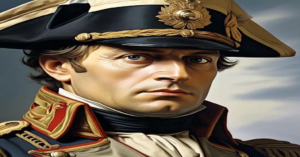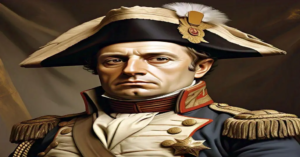Autobiography of Napoleon Bonaparte
Napoleon Bonaparte: The Emperor Who Changed Europe

Napoleon Bonaparte was the man who would define the start of the 19th century. He has more documented victories than any other battlefield commander in history. I guess you would think, you know, in terms of people like Julius Caesar or Alexander. And I would say in many ways he’s greater. He’s one of the most influential military leaders of all time.
Napoleon was exceptional in that his men truly loved him. From a relatively humble background, he rose to become the master of Europe. For somebody like that to become emperor. The ruler of the largest empire that Europe had seen really since the Middle Ages is just amazing.
Napoleon Bonaparte Early life
This is the rise of Napoleon. This government feels obliged to report this new crisis to you in full detail. Whether Russia claims provocation. What matters is that Russia has been wrong in its response. With this, we will be able to transform the jangling discords of our nation’s terror. Napoleon Bonaparte began his life in relatively modest circumstances.
He was born on the 15th of August 1769 on the island of Corsica. France had only acquired the island from the Republic of Genoa the previous year. Bringing it under French rule before the French Revolution. Napoleon is someone who is essentially condemned to mediocrity. He came from the minor gentry of a part of France that had only incorporated into France shortly before his birth.
His family is moderately influential on a local level. He has a large number of siblings and a lot of outdoor activities, not a lot of luxury, a mother who is very much down to earth, and a father who is involved in politics.
Napoleon Bonaparte Family
His family is moderately influential on a local level. He has a large number of siblings and does a lot of outdoor activities, not a lot of luxury. A mother who is very much down to earth and a father who is involved in politics.
But in many ways, he is a bit useless. When it comes to things like, you know, running the family finances, gambling, or, you know. Then, he leaves the family impoverished. So Carlo is probably not somebody that a young boy would necessarily look up to.
Carlo Bonaparte and his wife, Letizia, pregnant with Napoleon, had resisted the French. Takeover alongside the Corsican Nationalist leader Pasqual. This, however, ultimately failed, and Carlo Bonaparte, reading the writing on the wall, decided to change.
Napoleon Bonaparte Personal Life
The French took over CA; it took them about a year to more or less assert their control, and Carlo Bonaparte and, by extension, the Bonaparte family switched from being sort of pro-powerly freedom fighters for Corsican independence to being collaborators, and I think that that’s something that troubled Napoleon as he grew up.
But the French monarchy was very keen to integrate Corsica, so a great way of integrating any new territory is to get to know prominent families to send their sons either into the civil service or, in Napoleon’s case, into the army.
He manages to become a military officer, but an artillery officer, which is not a particularly socially distinguished thing to be because to be an artillery officer, you have to know things, and knowing things is very low class as far as the aristocracy is concerned.
Napoleon Bonaparte Political & Social changes

So, in the world of France in the 1780s, which is highly aristocratic in its outlook, Napoleon is if you want a future; if you want to do something big, you do it via the French route. Cora isn’t going to get you anywhere because PO is that sort of buffer; he’s that roadblock.
What Napoleon needed was a world-shaking political and societal upheaval that would remove the existing system of power and enable him to rise rapidly through the ranks of the French military. As it turned out, he would get his wish. The people of France were rising up, disillusioned with their out-of-touch monarchy. France was going to revolt.
Napoleon Bonaparte French revolution
So, the revolution of 1789 has some really deep roots. It’s rooted in the dysfunction of the French monarchy and its inability to fund its ambitions to be a world power. While having a very hierarchical internal social structure where being rich and powerful essentially means that you don’t have to pay very much tax, and this comes to a tremendous climax in the 1780s, ironically.
After the French had been on the winning side of the war of American independence. Then, they’ve built up such an enormous burden of state debt by that point that their rickety tax-collecting mechanisms just cannot cope anymore.
Napoleon Bonaparte Tax Reforms
The only way of reforming the tax system is to reform the entire structure, the political and social structure of France, and it’s, you know, I suppose, an alter. It’s like picking at a woolen sweater.
If you start pulling at a thread, the whole thing unravels, so the French Revolution starts out with tremendous optimism; it starts out with the belief that huge changes can be effected in society, but it also starts out with fear, paranoia, and conspiracies.
Napoleon Bonaparte – Monarchical Constitution?
The reason why the Parisians stormed the Bastille on the 14th of July is that 3 days earlier, the king’s brothers and other high-ranking aristocrats had sacked the reformist government and were trying to do away with the changes that had already been pushed.
After July of 1789, the National Assembly that had been gathered together spent two years trying to put together a monarchical constitution to have Louis the 16th on the throne to have political participation, to have rights, to have everyone paying their taxes, and everything being good and great, but it continually runs into deeper and deeper problems and crises.
Civil War,1791
Enlightenment rationalism encouraged people to pursue reforms. It also told them they could reform the Catholic Church, for example. But trying to reform the Catholic Church runs into the opinion of the upper echelons of society. This is one of the profound chasms that opens up within French society.
So by 1791-1792, you have a state of latent civil war. All these tensions that have been brought out over the previous three years are still brewing at the center of this Civil War. Where the Jacobins, led by Maximilien Robespierre. The Jacobins are Republicans, and they are Republicans of a radical bent.
Big Opportunity
These are people who wanted the execution of Louis the 16th. Really, they were looking for a very profound political transformation of France. They don’t just want a sort of change at the top. While keeping the existing system pretty much as is. But they’re very happy to use violence and terror to push the revolution forward.
The Jacobins had a strong influence on Napoleon. When he returned to France and rejoined his regiment in Nice in June 1793. Here, he wrote an account expressing his support for the radical republican group.
Not long after, perhaps as a result of this pro-Jacobin writing. Napoleon received his first significant opportunity.. He was called upon to lead the French artillery. As the Republican forces laid siege to the strategic port city of Toulon, a natural harbor. To this day, it remains the main port of France.
Basically, he thinks he’s one and there. Actually, he retreats to communicate that success back to his superiors. But he completed it a little bit ahead of the close of play. Then, the French managed to call up reinforcements.
Credit to Napoleon
Napoleon throws in his consular guard, and he plugs some gaps in the French line, uh, and then you get the arrival of Des, who comes in at a crucial moment and really catches, I think, the Austrians, who really think they have won, uh, by surprise and bundles them back to where they had started.
Inflicts, you know, a substantial number of casualties on the Austrian side in terms of killed and wounded. But above all, captured, so that really wrecks the Austrian Army.
Napoleon is saved again from possible defeat by General Desaix, who storms onto the battlefield of Maringo and gets himself killed in saving the day, enabling Bonaparte to claim all the credit.
Peace and Prosperity
France will find itself by 1801 able to be at peace, able even to bring the British to the peace table for the first time in this whole period because the British now know they have no Continental allies and no sense of how they could prosecute the war any further.
So, the Peace of Amiens was initially agreed to in late 1801 and formally signed in 1802, and for the next year or so, Napoleon really does appear as the PE maker of Europe.
He’s established a settlement where France is as dominant as a nation might want to be in that sphere of Western Europe, but it will turn out to be only a pause in the larger military story.
Artillery officer turn to the emperor
As a consequence, the regime becomes exactly what Napoleon Bonaparte thought it was I mean, Napo knew his history, and he knew the story of Charlemagne, who had been crowned by the pope on Christmas Day 800, and of course, that relationship implies that the emperor of the West owes his authority and legitimacy to the church as a mediator between God and secular power.
Really, Napoleon didn’t want to give that kind of impression in just 10 years. Napoleon Bonaparte went from an unknown artillery officer to the emperor of the largest empire in a thousand years.
His ambition did not stop there and would see Europe in an almost constant state of war for the next decade, an era aptly named the Napoleonic Wars. Napoleon had the opportunity, as he’d had the opportunity before, to sit back into being a great power.
His Legacy
But the future would prove that was never enough for him; there’s always more to strive for, and he, of course, after 1804, embarked upon the greater part of his territorial conquest with which he took Spain after 1808 and Russia in 1812.
It’s a fundamentally undemocratic regime, but a military victory. Really, you need to supply military victory. After the military victory, of course that came a route to conquest without limit. Although Napoleon’s military successes faltered and his mastery over Europe proved to be short-lived.
His legacy has endured to this day. If you look at France, it’s really under Napoleon’s direction and encouragement that the institutions of modern France are really created; its creation is promoted right down to all the codes of law. In every direction you look, you can see Napoleon’s hand.
Napoleon Bonaparte’s legacy is truly fascinating! His remarkable military strategies, political reforms, and influence on European history are still studied and admired today. From his rise as a revolutionary leader to becoming the Emperor of France, Napoleon’s impact is undeniable. His administrative reforms, including the Napoleonic Code, continue to shape legal systems globally. Truly an iconic figure who reshaped the course of history.